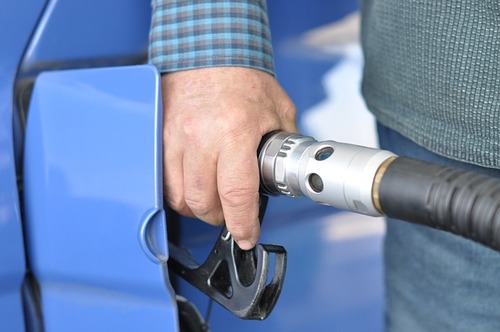Is Gas Bad For You?
Also Known As: gasoline, petrol
Short answer
Whether liquid or a gas, gasoline is a very harmful substance. It can cause extensive damage to the body when swallowed and when large amounts of vapor are inhaled, with serious cases resulting in death.
Category 'F' is for things that fail to bring anything beneficial to the table, and are very harmful to your health. We recommend completely avoiding anything in this category. Long-term side effects of 'F' items are usually very serious.
View Full Grading System
Category 'A'
Very healthy and numerous health benefits. Side effects are rare. Things rated an 'A+' are typically necessary for survival (for example, water).
Very healthy and numerous health benefits. A few harmful qualities may be associated, but only under certain circumstances such as an allergic reaction.
Very healthy and numerous health benefits. Harmful qualities may be associated, but aren't usually serious.
It is important to note that even the best things in life can become bad in immoderate amounts. So, although something may be rated an 'A+', overconsumption/overdoing can bring unwanted effects.
Category 'B'
Very beneficial to your health. Things rated a 'B+' may have a few harmful qualities to pay attention to.
Overall beneficial to your health. Things rated a 'B' may have some harmful qualities to pay attention to.
More beneficial to your health than not. However, harmful qualities are most likely associated and shouldn't be overlooked.
The main difference between category 'A' and category 'B' is the harmful qualities typically present in 'B' items. Serious side effects are usually uncommon, but are still possible and should be taken note of.
Category 'C'
Both beneficial and harmful qualities associated. Things rated a 'C+' are typically a bit more on the beneficial side. Still, moderation is important.
A fairly even ratio of beneficial and harmful qualities. Moderation is important. Very general topics that can lean towards both sides of the spectrum will be placed here as well. Rice, for example, can be good or bad depending on the type.
More harmful than beneficial. Side effects are common, especially when consumed/done excessively. Moderation is very important.
Category 'C' usually denotes to both good and bad qualities. When it comes to this category, it is important to keep this word in mind: moderation.
Category 'D'
Harmful to your health. Although benefits may be associated, the bad most likely outweighs the good. Moderation is very important.
Harmful to your health. A few benefits may be associated, but the bad outweighs the good. Moderation is extremely important.
Harmful to your health. Very few, if any, benefits are present. Things in this category should be avoided as much as possible.
Category 'D' is typically for things that are more harmful than beneficial. While consuming/doing something unhealthy once in a blue moon shouldn't hurt, we definitely recommend eliminating 'D' items as a regular part of your routine/diet.
Category 'F'
Category 'F' is for things that fail to bring anything beneficial to the table, and are very harmful to your health. We recommend completely avoiding anything in this category. Long-term side effects of 'F' items are usually very serious.
Category 'N'
'N' stands for neutral. Things placed into this category are generally (a) neither good nor bad for you, or (b) lack the necessary evidence to reach any conclusions.
Long answer
Gasoline (known as petrol outside of North America) is a colorless-amber volatile liquid that is highly flammable both in its liquid state and its gaseous state. It consists of many various hydrocarbons, with some of them, such as benzene, toluene, and n-hexane, being known carcinogens. Gasoline in itself is considered possibly carcinogenic, with animal studies showing that it may increase the risk of blood cancer and kidney cancer.
In its liquid state, gasoline may come into contact with the eyes or skin. Due to gasoline's quick evaporation rate, a drop on the skin or in the eye is not cause for immediate alarm. However, a lot of gasoline in the eye can cause significant damage. Dermatitis can result from long-term skin contact with gasoline. Something to keep in mind is that contact with liquid gasoline also means exposure to gasoline vapors.
While liquid gasoline can cause lung damage and death if swallowed, it is fairly difficult to accidentally swallow gasoline (even if a bottle were mislabeled, gasoline has a very distinct odor). The real danger comes from the vapor. Gasoline vapor is a nose and throat irritant and can damage the nervous system. Symptoms of vapor inhalation include drowsiness, dizziness, and confusion. If a lot of the vapor is inhaled, unconsciousness can result.
Yet another danger of gasoline - whether in its liquid state or gaseous form - is the fact that gasoline is highly flammable and can be explosive. Gasoline is not safe by any means, but if proper safety precautions are followed, it should not be a cause for concern.
This article is sponsored by CarComp.com
Possible short-term side effects
- skin irritation
-
dizziness
-
drowsiness
-
unconsciousness
-
confusion
-
eye damage
-
lung damage
-
death if large amounts swallowed
Possible long-term side effects
- cancer
-
dermatitis
-
death from lung damage
Ingredients to be aware of
- benzene
-
toluene
-
n-hexane
-
and many other hydrocarbons
Please turn your Ad Blocker off to see this content. Thank you!
Thank you for your feedback!
Written by Jeff Volling
Published on: 05-24-2016
Last updated: 12-28-2018
Thank you for your feedback!
Written by Jeff Volling
Published on: 05-24-2016
Last updated: 12-28-2018

 Approved by
Approved by 















